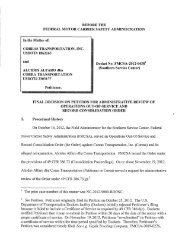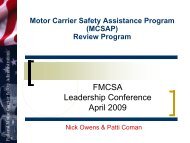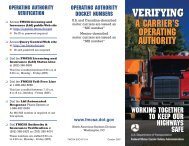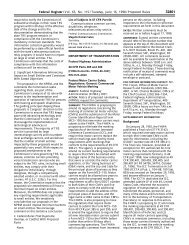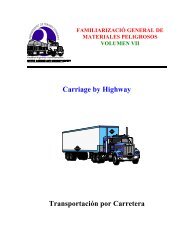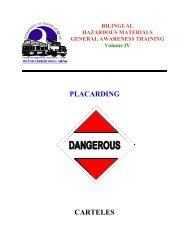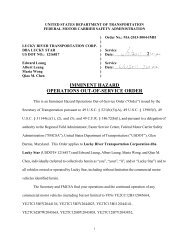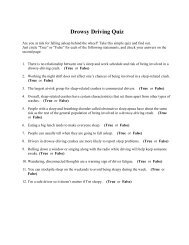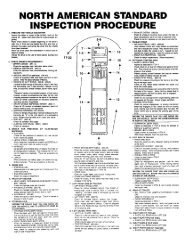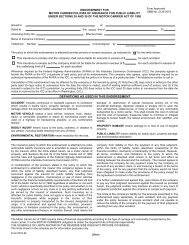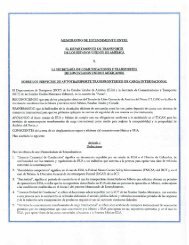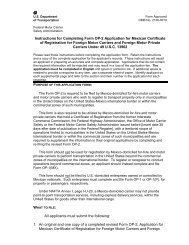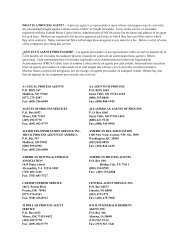Dear Sir/Madam - Federal Motor Carrier Safety Administration
Dear Sir/Madam - Federal Motor Carrier Safety Administration
Dear Sir/Madam - Federal Motor Carrier Safety Administration
Create successful ePaper yourself
Turn your PDF publications into a flip-book with our unique Google optimized e-Paper software.
<strong>Federal</strong> Register / Vol. 69, No. 161 / Friday, August 20, 2004 / Rules and Regulations 51595<br />
exercise its statutory authority under 49<br />
U.S.C. 506 to begin an investigation any<br />
time there is reason to believe there are<br />
violations of the safety regulations, or of<br />
the terms and conditions of a waiver,<br />
exemption, or pilot program.<br />
Furthermore, 49 U.S.C. 31315(b)(2)<br />
requires FMCSA to immediately revoke<br />
an exemption if: (1) The person fails to<br />
comply with the terms and conditions<br />
of the exemption, (2) the exemption has<br />
resulted in a lower level of safety than<br />
was maintained before the exemption<br />
was granted, or (3) continuation of the<br />
exemption would not be consistent with<br />
the goals and objectives of 49 U.S.C.<br />
Chapter 313 or 49 U.S.C. 31136. Section<br />
31315(c)(3) provides similar authority<br />
for revocation of participation of a<br />
motor carrier, commercial motor<br />
vehicle, or driver for failure to comply<br />
with the terms and conditions of the<br />
pilot program, or if continued<br />
participation would not be consistent<br />
with the goals and objectives of 49<br />
U.S.C. Chapter 313 or 49 U.S.C. 31136.<br />
FMCSA has granted 910 vision<br />
exemptions since 1998. As a result of<br />
the agency’s on-going monitoring<br />
activities, 19 exemptions were revoked<br />
for bad driving (the drivers contributed<br />
to accidents, had their licenses<br />
suspended or revoked, or received an<br />
excessive number of moving violations),<br />
and 11 were canceled for failure to<br />
submit required information. In<br />
addition, 20 drivers were denied<br />
renewals after the first two-year period<br />
because their driving records did not<br />
meet the safety level required by the<br />
statute (equivalent to, or better than, the<br />
level of safety that would be achieved<br />
by complying with the regulations).<br />
FMCSA believes it has the tools to<br />
effectively monitor persons operating<br />
under the terms and conditions of a<br />
waiver or exemption, or participating in<br />
a pilot program, and to take appropriate<br />
action for failure to comply with the<br />
requirements of the program. However,<br />
FMCSA does not believe motor carriers,<br />
CMVs, or drivers should be subjected to<br />
additional inspections or audits solely<br />
because a waiver or exemption has been<br />
granted, or participation in a pilot<br />
program has been approved. We believe<br />
the incentives for implementing<br />
innovative approaches to achieving<br />
safety performance goals would be<br />
overshadowed if the flexibility provided<br />
by the waiver, exemption or pilot<br />
program were coupled with more<br />
rigorous or frequent enforcement<br />
activities. We believe using <strong>Federal</strong> and<br />
State resources to conduct more<br />
frequent inspections and audits could<br />
adversely impact enforcement programs<br />
intended to identify and remove from<br />
service unsafe CMVs and drivers, as<br />
well as the resources used to target<br />
motor carriers that have demonstrated<br />
poor safety performance. Enforcement<br />
resources should be targeted at those<br />
motor carriers, drivers and vehicles that<br />
are most likely to pose a safety risk, not<br />
at potentially discouraging privatesector<br />
efforts to explore innovative<br />
approaches to achieving safety<br />
performance goals.<br />
Adoption of Interim Regulations<br />
FMCSA has not made any changes to<br />
its interim regulations based on the<br />
comments. On October 1, 2001, FMCSA<br />
made technical amendments to the<br />
interim regulations in Part 381 to<br />
remove references to the <strong>Federal</strong><br />
Highway <strong>Administration</strong>, the Office of<br />
<strong>Motor</strong> <strong>Carrier</strong> and Highway <strong>Safety</strong>, and<br />
the Office of <strong>Motor</strong> <strong>Carrier</strong> Research and<br />
Standards (66 FR 4986, 49872). Part 381<br />
remains divided into six subparts:<br />
Subpart A—General describes the<br />
purpose and applicability of part 381,<br />
and defines certain terms used<br />
throughout the part;<br />
Subpart B—Procedures for Requesting<br />
Waivers provides a plain-language<br />
description of waivers, the procedures<br />
for requesting a waiver and the process<br />
FMCSA will use to review waiver<br />
requests;<br />
Subpart C—Procedures for Applying<br />
for Exemptions provides a plainlanguage<br />
description of exemptions, the<br />
procedures for applying for an<br />
exemption, the process FMCSA will use<br />
to review exemption applications, and<br />
the conditions under which FMCSA<br />
will revoke an exemption;<br />
Subpart D—Initiation of Pilot<br />
Programs explains how pilot programs<br />
operate, and how a pilot program can be<br />
initiated (which includes a detailed list<br />
of informationFMCSA requests from<br />
individuals who would like to<br />
recommend that the agency start a pilot<br />
program);<br />
Subpart E—<strong>Administration</strong> of Pilot<br />
Programs codifies in the FMCSRs a<br />
plain-language version of the statutory<br />
requirements concerning FMCSA’s<br />
administration of pilot programs so that<br />
all interested parties will have a<br />
convenient reference; and<br />
Subpart F—Preemption of State Rules<br />
codifies in the FMCSRs a plain-language<br />
version of the <strong>Federal</strong> preemption of<br />
any State law and regulation that<br />
conflicts with or is inconsistent with<br />
respect to a person operating under a<br />
waiver, exemption, or pilot program.<br />
Regulations for Waiver and Exemption<br />
In accordance with section 4007 of<br />
TEA–21, FMCSA is authorized to grant<br />
waivers and exemptions from any<br />
FMCSRs under statutory authority of 49<br />
VerDate jul2003 15:27 Aug 19, 2004 Jkt 203001 PO 00000 Frm 00049 Fmt 4700 Sfmt 4700 E:\FR\FM\20AUR1.SGM 20AUR1<br />
U.S.C. 31136 and chapter 313. However,<br />
section 4007 of TEA–21 does not<br />
authorize FMCSA to grant waivers and<br />
exemptions from regulations issued<br />
under other statutes. For example, the<br />
financial responsibility regulations at 49<br />
CFR part 387, which were issued under<br />
49 U.S.C. 31138 and 31139, pertain to<br />
transportation of passengers and<br />
property, respectively. FMCSA also<br />
does not have authority to grant waivers<br />
and exemptions from other<br />
requirements such as surety bonds and<br />
policies of insurance for motor carriers<br />
and property brokers, and surety bonds<br />
and policies of insurance for freight<br />
forwarders. These requirements, which<br />
were transferred from the former ICC,<br />
are now codified at 49 CFR part 387.<br />
These requirements are based on<br />
statutory authority at 49 U.S.C. 13101,<br />
13301, 13906, and 14701.<br />
In another example, FMCSA does not<br />
have authority to grant a waiver or<br />
exemption from 49 CFR<br />
396.25,Qualifications of Brake<br />
Inspectors. This regulation establishes<br />
minimum qualifications for motor<br />
carrier employees responsible for the<br />
inspection, repair, and maintenance of<br />
CMV brake systems, and was required<br />
by the Truck and Bus <strong>Safety</strong> and<br />
Regulatory Reform Act of 1988<br />
(49U.S.C. 31137(b)).<br />
To assist the motor carrier industry<br />
and the general public in identifying the<br />
requirements for which waivers and<br />
exemptions may be granted, FMCSA is<br />
retaining the list in §§ 381.200, 381.300,<br />
and 381.400 which define a waiver,<br />
exemption, and pilot program,<br />
respectively. The list of regulations for<br />
which a waiver or exemption could be<br />
granted includes:<br />
(1) Part 382 Controlled Substances<br />
and Alcohol Use and Testing;<br />
(2) Part 383 Commercial Driver’s<br />
License Standards; Requirements and<br />
Penalties;<br />
(3) § 390.19 <strong>Motor</strong> <strong>Carrier</strong><br />
Identification Report;<br />
(4) § 390.21 Marking of Commercial<br />
<strong>Motor</strong> Vehicles;<br />
(5) Part 391 Qualifications of Drivers;<br />
(6) Part 392 Driving of Commercial<br />
<strong>Motor</strong> Vehicles;<br />
(7) Part 393 Parts and Accessories<br />
Necessary for Safe Operation;<br />
(8) Part 395 Hours of Service of<br />
Drivers;<br />
(9) Part 396 Inspection, Repair, and<br />
Maintenance (except § 396.25); and<br />
(10) Part 399 Step, Handhold, and<br />
Deck Requirements.<br />
FMCSA excluded the accident register<br />
requirements, 49 CFR 390.15, from the<br />
list of regulations eligible for a waiver<br />
or exemption because the agency<br />
believes it has a responsibility to



